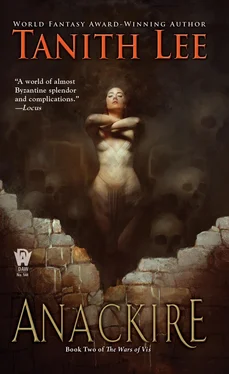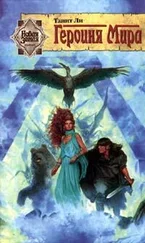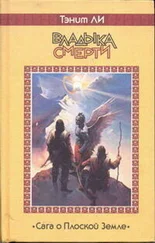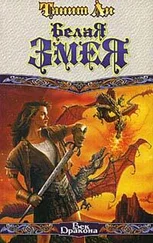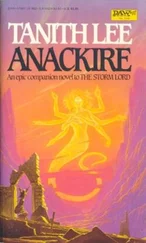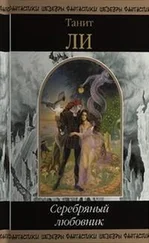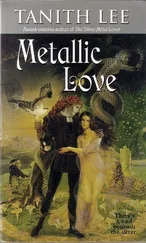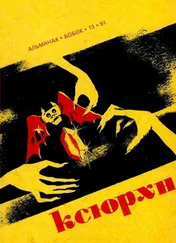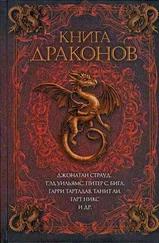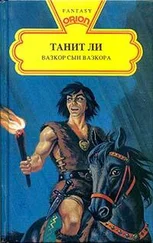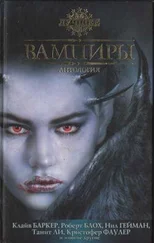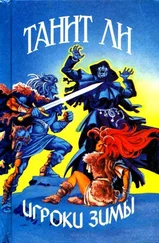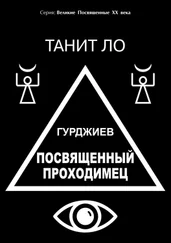They had not lost a single vessel, or one man.
Their slaves clamored below, an outcry, in which the names of many gods were mingled.
Yl kneeled trembling before the little Rorn god in the prow.
Above, the ochre sail had parted from the yard. The emblem of the Leopard of vengeance and war had been smeared into shapelessness as if by some immense hand.
The gods walked all Vis that day.
Ten miles from Saardos, Rorn appeared before thirty-five Free Zakorian ships, admonished them, and turned them. He kept one foot on the distant land as He breathed on their sails and blew them southward. The fleet of Alisaar encountered Him, too. When men, maddened by the sight, tried to immolate themselves in His honor, Rorn told them such death was not needful. The Shansarians in the fleet, however, declared they had witnessed Ashara of the fish’s tail. The sun was caught in Her golden hair. Her breasts were lovely. She reminded them of the Homeland.
As, in the person of Ashkar, She reminded the Vardians, Tarabines and Vathcrians in Xarabiss, the Lowlands, and elsewhere.
Close to the port of Lin Abissa, She uncoiled from the road, and Her skin was honey. Her serpent’s tail red copper, and Her hair was red as wine. But the Free Zakorians there saw Rorn, striding through the charcoaled ships, the smoke on His shoulders.
In Thaddra it was Zarduk, Who routed Yl’s forces from the border forts of Vardian Zakoris. And Zarduk, too, on the mountain Pass above Tumesh, Who rose out of the stones. The sun was not in His eyes, it made His belly. Black, magnificent, His masculine form enclosed the whirling solar disc. His breath was incense and heat, a scorching dust wind.
The Dortharians on the Pass saw this: A dragon out of their mythological genesis. It drove down the sky; incendiary beams shot from its carapace and jaws. They expected both the enemy and themselves to be at once incinerated. But not a man was lost, here as elsewhere.
Zarduk was in the delta of the Okris.
The spoons of catapults snapped off against their buffers. The black ships shuddered. Zarduk’s feet were braced in the river, which barely reached His knees, his fiery belly blinded them, or should have done. Anackire, or a creature much like Her, was positioned at His left side.
In Ommos, the god was duality, both feminine and male: Zarok-Anackire.
In Ylmeshd, Yl’s city in Thaddra, a golden glow stained the anthill dwellings, emanating from the cave temple of the fire god, causing some panic.
It was said that priests, stealing in to see, found the topaz Eye from Ankabek, brighter than a lamp, had been transported of itself into one of the eye-places of the Zarduk. That a Zakorian deity should have, thereafter, half the gaze of a Lowlander, was so suitable to resultant legends of that day, it was later suggested Yl himself, not the gods, organized the matter on his return.
Ashara appeared to blasted Karmiss. She rose above Ioli like a daytime moon. In Istris, Rorn had seemed to shake the city, very gently, as if to shift crumbs from a mat.
Stray Leopard ships making for Lan came upon Him seated on the ocean. He said they must go back to Thaddra. They believed Him.
The versions were endless. All differed. Ten men in one place had each seen a vision no other saw. Stars fell, mountains moved, bells rang in the sea.
Yet the words, uttered to the ear, the brain, or the heart—they were substantially the same.
And the felled ballistas, the broken swords, lay thick as flowers where the dead should have lain.
The four fires, the burning-glass, joined like the amber ring, now letting go the light.
Each drew away, became an incandescent dot. The web of force grew dim. Went out.
The dulling of the vast effulgence revealed another, lesser effulgence, where, everywhere, there were shining the tiny faint lights, the miniature trusts and prayers of a world, the will of a multitude to persist—fuel for the vaster flame. And then these also were dimmed. All but one.
The shattered mirror, that had been the focusing will of Raldanash, embers now, retained to itself the palest after-images of linking fire, one of which led northwest to the man who was his kindred, and one northeast toward the aurora of Ashni. But the subsiding embers could not sustain these connections. The trails of fire vanished. Soon only one slender and translucent link remained, scarcely visible while the larger lights had blazed.
This final light did not yet fade.
Its nether point, located on that line of Power which ran from Koramvis to the Zor, was the place of the earliest sacrifice, Ankabek.
She felt his dying, embers to clinker. Raldanash who had been her husband, far away, miles of land and space and time.
She had come to her discovery along a steep and sightless mental tunnel, which she entered voluntarily when the door mechanisms closed her within the Sanctum. At the closing, she had lain down on the marvelous mosaic floor she could not see, and eventually, after some struggle, her ego and her name had gone from her.
Ulis Anet. Val Nardia. Astaris. She had been each of them and none.
She had trusted that Eraz would guide her, but she must guide herself, and so she did. She was so tired, it was not hard to choose this road, or follow it.
As if in a boat on a black winding river, she poled upstream, sleeping or awake she could not be sure, nor did it concern her.
Her mind filled itself slowly. The deep dreams, the conclusions, the solitudes. She herself came last of all, behind a train of fantasies. The inner she.
And so at length she opened the single eye of the spirit, and became one with the will of the world.
And when that will, having created its great sorcery, flowed away, she beheld Raldanash and how he died.
A mortal woman, she had detested him for his unintentional cruelty. Such pettiness was irrelevant now. Now, emerging from her own purgation, she knew his, reckoned up what he had given, asking no recompense. She herself had no special psychic endowment, but she, like all things, held the magic of the force of life. And all around were the stones of Ankabek of the goddess, invocation of Anackire.
Selfishly then, to redeem her own pain by knowing its littleness, she held out the lamp of Ankabek, slightest of fires.
And so she did learn pain’s littleness. She learned in the surge of joy as this stranger, who was nothing to her and to whom she was nothing, yet heard her, yet answered, and reached out across the endless distances to receive the proffered light.
The ships of Dorthar circled in the vortex of sea and sea-wrapped wind.
Only the Amanackire had dared go to the Storm Lord and lift him. He was borne to the cabin.
Without comprehending, his men had seen he was the pivot of the miracle. Now, contending with the tempest, there was no leisure to dwell on it.
Some wept, but there was salt water on all their faces.
Raldanash lay on the royal couch as the ship jumped at the blows of the storm.
The Amanackire stood by. They did not mourn. Ruthless in their faith, and pitiless, certain all men lived forever. What was death? Having only just participated in the lesson, they had missed it. Physical life was also sacred, and to be saved.
Then they felt the telepathic stirring, turned to Raldanash, and saw his eyes open, the golden eyes in the dark face.
He had come back from somewhere he had already forgotten.
His body was weak and drained, listless, would scarcely obey him or acknowledge him. But the vitality in him was like a seed, which would become again the tree. His brain was already vital.
He did recollect the instant, in the very act of falling, that he had seen they had won.
The symbols were no more than that, gods were the emblem, as language was the expression of incorporeal thought. They had used only the power and strength and faith of mankind. It had been enough. The world was ended, and begun.
Читать дальше
